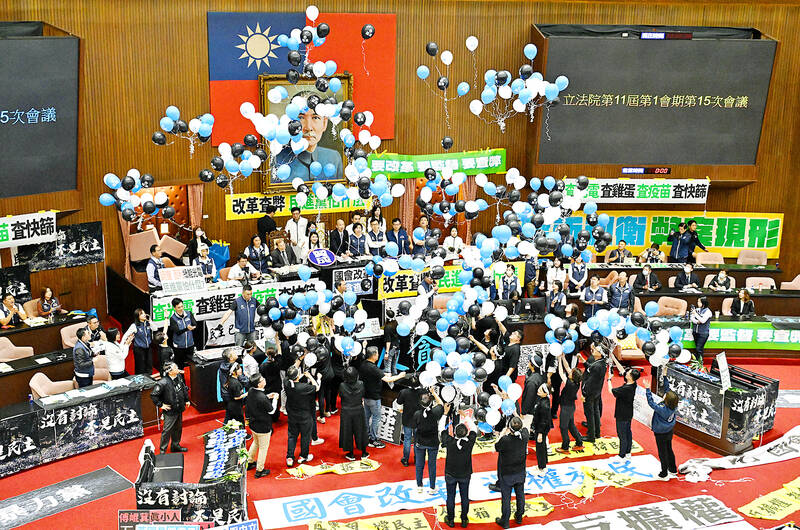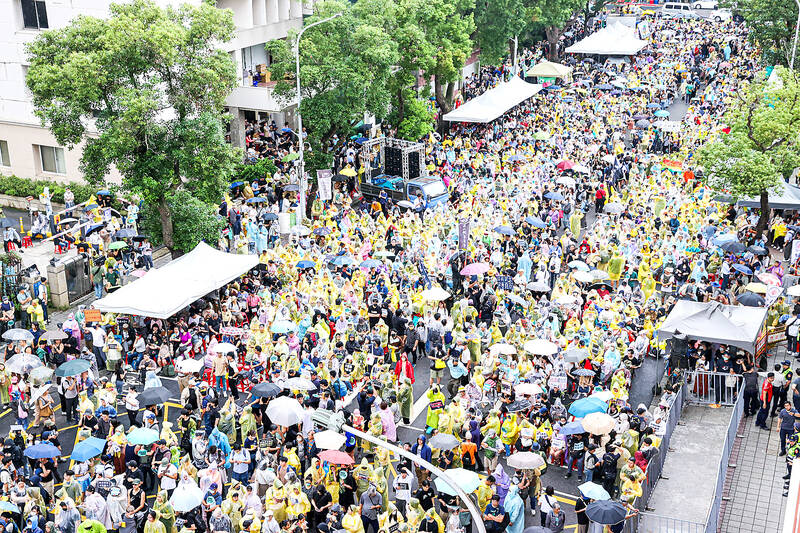The Legislative Yuan yesterday passed the second reading of amendments that would strengthen its investigative powers, while an estimated 100,000 people protested outside.
The amendments that were sent to the third and final reading include an article denying people compelled to testify before lawmakers as witnesses the right to legal counsel without permission from the investigation committee chairperson, as well as fines for those who refuse to appear before or answer questions at hearings.
The amendments would grant the Legislative Yuan formal “investigative powers,” in contrast to the existing law, which simply stipulates that lawmakers have the right to ask for documents from government agencies.

Photo: Liao Chen-huei, Taipei Times
Chinese Nationalist Party (KMT) and Taiwan People’s Party (TPP) lawmakers passed the amendments amid bitter opposition from the Democratic Progressive Party (DPP) and procedural battles that slowed the session to a crawl.
Deliberations were expected to continue until midnight and were still ongoing as of press time last night.
As of 9:30pm, about 100,000 people had gathered outside to protest the bills and non-transparent procedures, organizers said.

Photo: CNA
The Taipei Police Department sent 500 officers to establish a cordon between protesters and counter-protesters, a police spokesperson said.
The proposed amendments to the Criminal Code and the Act Governing the Legislative Yuan’s Power (立法院職權行使法) would give lawmakers the authority to launch investigations of officials and private entities.
The proposed change to Article 50 of the act would require a person or entity testify at the legislature as witness to submit a request with the chairperson of the investigative committee to allow legal counsel during their hearing.
The amendments that lawmakers passed yesterday stipulate that government officials must testify truthfully at hearings or face impeachment or reprimands to be determined by a vote at the legislature, and they may be prosecuted for offense in the Criminal Code.
Those whose presence is requested cannot, without legitimate reason, be absent, refuse to answer, refuse to provide testimony or designated materials.
Legitimate reasons include if the matter in question relates to state secrets relating to national defense, security and foreign relations.
Other reasons for non-compliance can include when the questions go beyond the purpose of the hearings or pertain to personal privacy or secrets that should be protected in accordance with existing laws.
Those in violation of said requirements — with the approval of the legislature — would be fined between NT$10,000 and NT$100,000, with repeated fines possible.
If statements provided by related individuals asked to provide testimony are found to be false, those persons could be fined between NT$20,000 and NT$200,000 with the approval of the legislature.
According to the amendments, an official is declared to be making false statements if five members of an investigative committee support the accusation by petition or motion followed by a general vote.
The proposed changes include a provision for secret hearings if the legislature’s probe touches on state secrets, commercial secrets, matters of personal privacy, or information whose publication could endanger a person’s life or bodily safety.
These secret hearings can be partially or wholly classified, and legislators are obliged to protect any sealed information, the proposed amendments to Article 59 of the Act Governing the Legislative Yuan’s Power read.
Legislative Yuan committees and investigative task forces may hold hearings to impeach the president and vice president, or exercise the legislature’s right to approve the appointment of officials, the amendments said, citing Article 67 of the Constitution.
Hearings are authorized at the consent of the chairperson or a third of the members of the Legislative Yuan’s Committee of the Hull House, standings and ad hoc committees, investigative committees and investigative task forces, they read.
The lawmakers began the day at 5:30am and began jostling for control of the doors to the chamber and the podium in a chaotic scene, with a fistfight erupting between DPP Legislator Lin Shu-fen (林淑芬) and TPP Legislator Mai Yu-chen (麥玉珍).
The KMT and TPP legislators pushed their DPP counterparts from the podium at about 10am and began passing the amendments article by article.
DPP legislators chanted that the votes were being held illegally via a “procedural black box” and that the day’s session should be nullified, while KMT lawmakers chanted that DPP members were sore losers and that legislative reforms were necessary.
Later in the evening, DPP lawmakers released blue, white and black balloons to represent the Legislative Yuan being haunted by “the specter of of KMT, TPP and black box procedures.”
DPP caucus whip Ker Chien-ming (柯建銘) said that proceedings over the past days allowed Chinese President Xi Jinping (習近平) to declare “martial law” over the nation’s Legislative Yuan in “a death knell for the legislature.”
DPP Legislator Fan Yun (范雲) said the proposals amount to giving lawmakers the power to summon Taiwanese at will while stripping those being questioned of their right to remain silent or have a lawyer.

AIR SUPPORT: The Ministry of National Defense thanked the US for the delivery, adding that it was an indicator of the White House’s commitment to the Taiwan Relations Act Deputy Minister of National Defense Po Horng-huei (柏鴻輝) and Representative to the US Alexander Yui on Friday attended a delivery ceremony for the first of Taiwan’s long-awaited 66 F-16C/D Block 70 jets at a Lockheed Martin Corp factory in Greenville, South Carolina. “We are so proud to be the global home of the F-16 and to support Taiwan’s air defense capabilities,” US Representative William Timmons wrote on X, alongside a photograph of Taiwanese and US officials at the event. The F-16C/D Block 70 jets Taiwan ordered have the same capabilities as aircraft that had been upgraded to F-16Vs. The batch of Lockheed Martin

US President Donald Trump yesterday announced sweeping "reciprocal tariffs" on US trading partners, including a 32 percent tax on goods from Taiwan that is set to take effect on Wednesday. At a Rose Garden event, Trump declared a 10 percent baseline tax on imports from all countries, with the White House saying it would take effect on Saturday. Countries with larger trade surpluses with the US would face higher duties beginning on Wednesday, including Taiwan (32 percent), China (34 percent), Japan (24 percent), South Korea (25 percent), Vietnam (46 percent) and Thailand (36 percent). Canada and Mexico, the two largest US trading

GRIDLOCK: The National Fire Agency’s Special Search and Rescue team is on standby to travel to the countries to help out with the rescue effort A powerful earthquake rocked Myanmar and neighboring Thailand yesterday, killing at least three people in Bangkok and burying dozens when a high-rise building under construction collapsed. Footage shared on social media from Myanmar’s second-largest city showed widespread destruction, raising fears that many were trapped under the rubble or killed. The magnitude 7.7 earthquake, with an epicenter near Mandalay in Myanmar, struck at midday and was followed by a strong magnitude 6.4 aftershock. The extent of death, injury and destruction — especially in Myanmar, which is embroiled in a civil war and where information is tightly controlled at the best of times —

China's military today said it began joint army, navy and rocket force exercises around Taiwan to "serve as a stern warning and powerful deterrent against Taiwanese independence," calling President William Lai (賴清德) a "parasite." The exercises come after Lai called Beijing a "foreign hostile force" last month. More than 10 Chinese military ships approached close to Taiwan's 24 nautical mile (44.4km) contiguous zone this morning and Taiwan sent its own warships to respond, two senior Taiwanese officials said. Taiwan has not yet detected any live fire by the Chinese military so far, one of the officials said. The drills took place after US Secretary